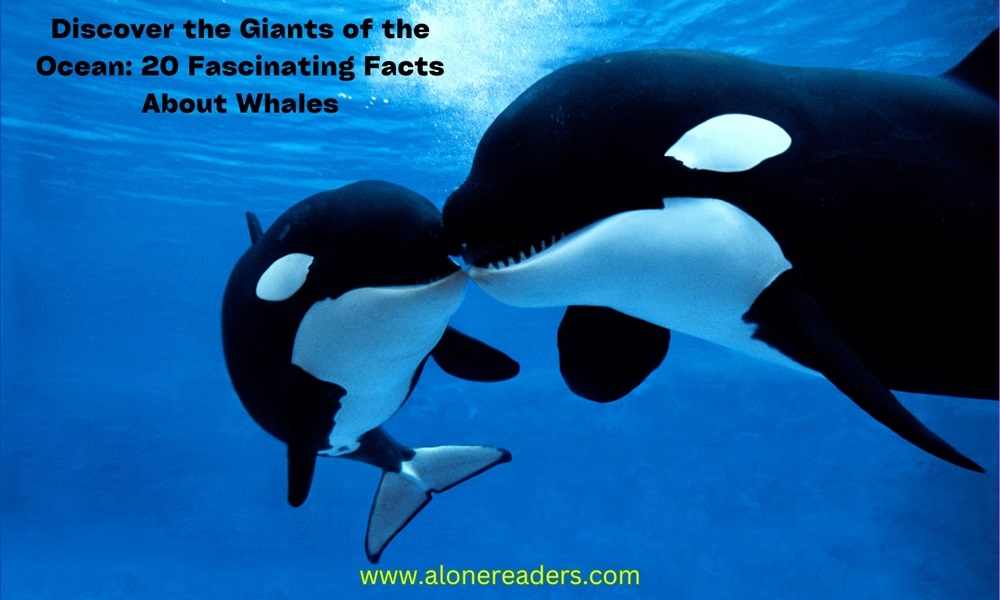
Whales, the gentle giants of the ocean, have fascinated humans for centuries. These majestic marine mammals are not only vital to the ecosystem but also have a plethora of intriguing characteristics that set them apart. In this article, we dive into 20 interesting facts about whales, offering a glimpse into their remarkable world.
Whales hold the record for the largest animals ever to exist on Earth. The blue whale, in particular, can grow up to 100 feet long and weigh as much as 200 tons, making it larger than the largest dinosaurs.
Some whale species are known for their incredible diving abilities. The sperm whale, for instance, can dive over 2,000 meters deep and hold its breath for up to 90 minutes, making it one of the deepest diving mammals.
Whales are among the longest-distance migrants in the animal kingdom. Species like the humpback whale travel thousands of miles between their feeding and breeding grounds each year.
Whales are famous for their vocalizations, which can travel for many miles underwater. The songs of the humpback whale are particularly complex and can last for hours.
Whales have diverse diets ranging from tiny krill to large marine mammals. For instance, blue whales primarily feed on krill, while orcas (killer whales) have a more varied diet that includes fish, seals, and even other whales.
Different whale species have developed unique feeding strategies. The bubble net feeding of humpback whales, where they create a net of bubbles to trap fish, is a remarkable example of their hunting prowess.
Many whale species exhibit complex social behaviors. Orcas live in tight-knit family groups known as pods, and these relationships can last a lifetime.
Whales can have incredibly long lifespans. The bowhead whale is known to live over 200 years, making it one of the longest-lived mammals.
Whales have been an integral part of human culture and mythology for thousands of years, symbolizing various themes from creation to transformation across different cultures.
Some species of whales, like the sperm whale, use echolocation to navigate and hunt in the dark depths of the oceans. They emit sound waves that bounce off objects, helping them to "see" their surroundings.
Despite living in the ocean, whales are mammals and need to breathe air. They come to the surface to breathe through blowholes located on top of their heads.
Whales are known for their playful behavior, which includes breaching (jumping out of the water), slapping their tails and fins on the water surface, and even interacting with humans.
Many whale species are considered endangered due to threats like hunting, habitat destruction, and pollution. Efforts are being made globally to protect and conserve these magnificent creatures.
Climate change is impacting whale migration patterns. As ocean temperatures shift, so do the locations of their prey, which can affect whale migration routes and breeding grounds.
Whales play a crucial role in the ocean's ecosystem. Their movements and feeding habits help to circulate nutrients throughout the water, supporting marine life at all levels.
Whales have a keen sense of hearing, which is crucial in the dark ocean depths. Their sense of smell, however, is not as developed due to their aquatic lifestyle.
Whales have an interesting way of sleeping; they rest half their brain at a time. This allows them to continue breathing and stay alert to dangers even while resting.
Interestingly, whales can help combat global warming. Through their fecal plumes, they release large amounts of iron and nitrogen that stimulate the growth of phytoplankton, which in turn absorbs carbon from the atmosphere.
Fossil records show that whales evolved from land-dwelling mammals that returned to the water approximately 50 million years ago. This evolutionary journey is one of the most fascinating in the animal kingdom.
Whale watching has become a popular activity, allowing people to appreciate these creatures in their natural habitat. This has also helped in raising awareness about the importance of whale conservation.
Conclusion
Whales, with their immense size, intriguing behaviors, and vital role in the marine ecosystem, continue to captivate and inspire us. As we learn more about these magnificent creatures, it becomes increasingly important to protect them and their habitats for future generations to marvel at and learn from.